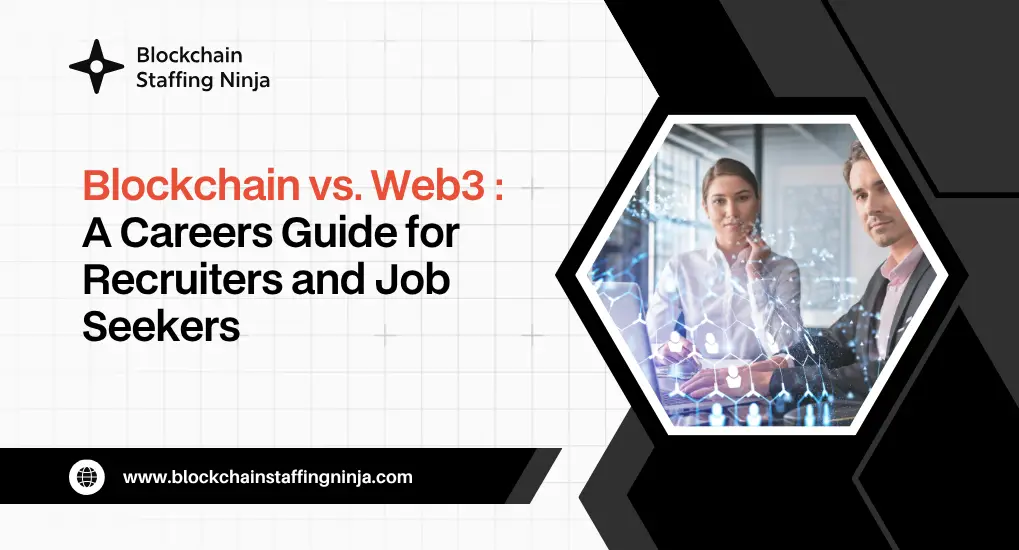Blockchain is a shared, unchangeable ledger that eases exhaustive tasks like recording transactions and overseeing assets across widespread business networks. Digitization prioritizes trust, security, and transparency as paramount, making Blockchain technology significant in today’s digital world. Web3 is the common term coined for decentralized technologies to possess control over their data and finds its significance predominantly in data sharing and usage. Comprehending these differences is necessary for both recruiters and job seekers, as these mold the destiny of the internet and numerous other industries.
What is Blockchain?
The most coveted blockchain technology is a decentralized, distributed ledger that records transactions across various networks transparently and securely. Its built-in mechanisms prohibit unauthorized transactions by creating unanimously consistent records in a shared view of the transactions. Blockchain technology is primarily used in cryptocurrencies like Bitcoin and the finance, supply chain, and healthcare sectors by digitizing the entire business sphere and imparting intense security and transparency. Blockchain reduces risks caused by fraudulent actions and human carelessness, decreasing process duration and lowering capital requirements.
What is Web3?
With a profound vision to include cryptocurrencies, DAOs, NFTs, decentralized finance, and more, Web3 development, or the blockchain-based web, is rightly called the future of the internet. Web3 seeks to produce a decentralized web wherein users can manage their own information and interact without depending upon centralized forums like social media. With inherent traits like privacy, decentralization, and security, Web3 proactively provides a wholesome, refined dimension to online expertise.
Key Differences Between Blockchain and Web3
One of the critical differences while analysing Blockchain vs Web3 lies in their prime focus. Blockchain primarily forms the basic technology endowed with the potential to provide transparent and secure transaction methods, while Web3 is an open architecture using Blockchain to decentralize the internet. To maintain authentic records, Blockchain duplicates a transparent and secure database over numerous networked systems, facilitating entities to communicate without mediators. While cryptographic keys are used to access ledgers, smart contracts instantaneously carry out agreements based on predefined clauses.
On the other side of the coin, Web3 attains this through decentralized platforms, which eventually bestow a pivotal structure in developing decentralized applications (dApps). Subsequently, dApps function on homogenous networks, permitting secure and transparent data transmission.
|
Feature |
Blockchain |
Web3 |
|
Definition |
A decentralized digital ledger that records transactions securely. |
The next generation of the internet is built on blockchain technology. |
|
Purpose |
Ensures secure and transparent data storage and transactions. |
Aims to create a decentralized internet with user control. |
|
Technology Base |
Uses cryptography to record transactions on a distributed network. |
Uses blockchain to build decentralized applications (dApps). |
|
Focus |
Secure and immutable data storage. |
Decentralized control over online platforms and data. |
|
Examples |
Bitcoin, Ethereum, Hyperledger. |
Decentralized applications (dApps), DAOs, NFTs. |
|
Data Control |
Data is secured and verified on a distributed network. |
Users own and control their data without intermediaries. |
|
Use Cases |
Cryptocurrency, supply chain management, financial transactions. |
Decentralized finance (DeFi), gaming, social media, and identity management. |
|
Role in Web3 |
The foundational technology that enables Web3. |
A broader concept that includes decentralized applications, smart contracts, and user-driven experiences. |
How Blockchain and Web3 Affect Recruiters
The advent of Blockchain and Web3 development creates a fresh digital economy that directly impacts both blockchain and Web3 job opportunities. This new digital economy demands a distinct skillset from job seekers in Blockchain careers. Undoubtedly, the rising demand for new skills in emerging roles like Blockchain developers, Smart contract analysts, Web3 engineers, dApp developers, or Cryptocurrency analysts assures rapid career growth for those with phenomenal technical expertise.
The Web3 and Blockchain recruitment panels are pushed to identify candidates with the right skill set in these domains to carve niches in the blockchain sphere. Eventually, job seekers are expected to enhance their skill set by pursuing relevant certifications and actively participating in the thriving Web3 communities.
Opportunities for Job Seekers in Blockchain and Web3
To those passionate about reaching heights in the crypto realm, the industry brims with blockchain and Web3 job opportunities of every genre. The race to attain heights being intense, solid preparation and ample industry engagement stand paramount to thrive in Web3 recruitment interviews. Revisiting coding skills, sharing experiences with knowledge on smart contracts and dApps, and exhibiting previous exposure on Web3 from the job requirement’s perspective are some tips that let you stand out or latch on to your dream roles.
Ensure that you draft your portfolio with relevant previous Blockchain careers if you are an experienced professional. It is not about flaunting your skills but manifesting your passion for Blockchain technology and Web3 development.
Why Recruiters and Job Seekers Must Embrace Blockchain and Web3
Discerning the facts behind Blockchain vs. Web3 assures us they journey towards an extensively decentralized networking space together. Blockchain’s transparent trait and inherent security form the foundational blocks for Web3 development. These technologies are prone to swift changes, which cause potential impacts in the digital economy. Hence, keep yourself updated about the innovations in these realms, and ensure active participation in blockchain forums, for the journey is exciting, enticing, and enthralling!
To stay aligned with shifting talent needs in the decentralized economy, leveraging a trusted Web3 recruitment agency can offer a competitive edge for both recruiters and job seekers.
 blockchain-staffing-ninja
blockchain-staffing-ninja